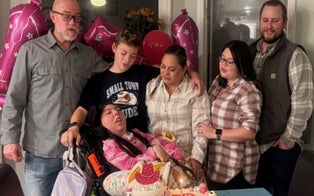RaMell Ross was stunned when he scored an Oscar nomination for Best Documentary Feature for his first documentary last month.
RaMell Ross was stunned when he scored an Oscar nomination for Best Documentary Feature for his first documentary last month.
"I'm sitting with my partner," Ross told InsideEdition.com. "... Then they say 'Hale County This Morning, This Evening.' And then we both look at each other and we like blink and then look back at the screen kind of dumbfounded."
Ross' film, "Hale County This Morning, This Evening," follows two men, Quincy Bryant and Daniel Collins, over the course of five years in Greensboro, Alabama, the county seat of Hale County. His goal, he said, was to showcase the challenges of everyday life in the Alabama Black Belt, a region of the U.S. known for its majority-black population.
Shooting was simple as Ross already had an established bond with the men.
"I taught Quincy in a youth program and I worked with Daniel coaching at the high school," said Ross. "And so, we had a pretty solid relationship that made the process of filming almost even secondary."
He added: "Of course, they didn't know what they were getting into. They didn't know it was going to be a five-year project."
The movie isn't a typical documentary: It features little dialogue, centering not on dramatic moments, but quiet ones, according to Ross.
"The film is about the banal moments, the sort of interstitial moments, the moments that aren't very dramatic," Ross said. "And so, in the film you'll see someone taking furniture up the stairs or people in a yard talking trash to each other while their grandmothers go by. You'll see folks goofing around in a parking lot.
"Just kind of the universal moments that people have, being with their friends," he continued.
While Ross is just happy to be nominated, he said the real emotion would come if he wins.
"I think if we won I would be unable to walk up there," he said. "I think I would be in such shock."
He added: "I cry for pain. I cry for suffering. I don't quite cry for joy, you know? I think I'd probably start crying. Openly. And say something that's way too sentimental, but I would mean it."
RELATED STORIES





